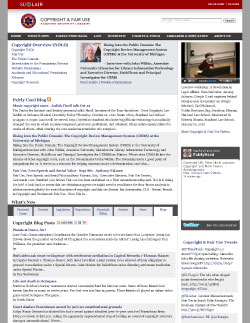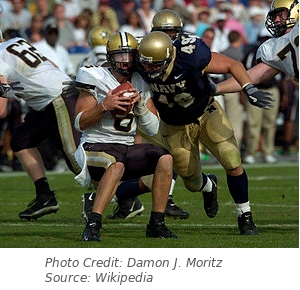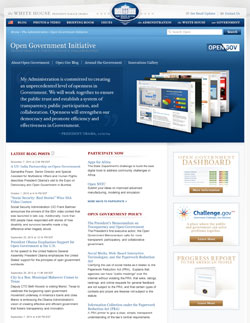 Given that some of our favorite Justia supporters and friends are law librarians and to help get us all into the holiday spirit of the season, we thought it might be fun to put together a list of library and legal-themed gifts for those folks who keep us on track and organized when it comes to legal research and information. (And for those of our readers who practice law, fear not. We have a separate list coming out for you this week as well!)
Given that some of our favorite Justia supporters and friends are law librarians and to help get us all into the holiday spirit of the season, we thought it might be fun to put together a list of library and legal-themed gifts for those folks who keep us on track and organized when it comes to legal research and information. (And for those of our readers who practice law, fear not. We have a separate list coming out for you this week as well!)
Articles Posted in November, 2010
 These presents aren’t going to wrap themselves, folks.
These presents aren’t going to wrap themselves, folks.You’re at work, but you’re on Amazon and Overstock searching for deals, right? It’s Cyber Monday–the online equivalent of Black Friday, where the web stores are jammed with consumers distracted at work. Amazon and Target even have special sales on this day and advertise with the adwords “Cyber Monday.”
I guess I’m a scrooge [ed: Ebeneezer Scrooge was a banker, not a lawyer], but the first thing I thought of was how much tax money the state governments were going to get screwed out of today. And thus, a blog post was born.
It turns out that a 1992 US Supreme Court Case, Quill Corp. v. North Dakota 504 U.S. 298 (1992) held that retailers are exempt from collecting sales taxes in states where they have no physical presence (nexus), such as a store, office, or warehouse. The case dealt with a catalog/mail order business, but it has since been applied to Internet retailers. The Court felt that requiring businesses to collect sales tax from 50 states with different rules would amount to an undue burden on interstate commerce.

- Free Law – Justia truly believes that the law belongs to the people. It was created for us, by us. That is why we are thankful for Law.Gov, the brainchild of passionate Government open source advocate Carl Malamud of Public.Resource.Org.
- Google – We are thankful for Google and its continued support of free law by awarding the non-profit Public.Resource.org a $2 million grant to jump-start the Law.Gov initiative. The grant was one of five awarded to Google Project 10^100 winners, a contest to help as many people in the world as possible.
- Facebook – We are thankful for Facebook because we really like making friends. 🙂
- Twitter – We are thankful for Twitter. We love tweeting about the law like little birdies 🙂

 One of the pro bono projects we’ve been able to work on here at Justia is the Stanford Fair Use & Copyright site. For those of you who may not be familiar with it, the site is a terrific resource for anyone interested in learning more about copyright in general, as well as for researchers more focused on exploring issues related to the fair use of copyrighted materials. We frequently update the site, so we encourage even those of you who may already be familiar with it to stop by and check it out!
One of the pro bono projects we’ve been able to work on here at Justia is the Stanford Fair Use & Copyright site. For those of you who may not be familiar with it, the site is a terrific resource for anyone interested in learning more about copyright in general, as well as for researchers more focused on exploring issues related to the fair use of copyrighted materials. We frequently update the site, so we encourage even those of you who may already be familiar with it to stop by and check it out!
 In October 2009, the House Judiciary Committee held a contentious hearing on the NFL’s response to brain injuries in current and former players. The chairman of the NFL committee on brain injuries subsequently resigned. In December 2009, the NFL announced stricter guidelines for returning to play after a player sustains a concussion on the field.
In October 2009, the House Judiciary Committee held a contentious hearing on the NFL’s response to brain injuries in current and former players. The chairman of the NFL committee on brain injuries subsequently resigned. In December 2009, the NFL announced stricter guidelines for returning to play after a player sustains a concussion on the field.
The new guidelines require that players who suffer concussions cannot return to a game or practice until they show no further symptoms of concussion and are cleared by both the team doctor and an independent neurologist.

The New York Times ran a fascinating story this week about third-party financiers of lawsuits. The Times, together with the Center for Public Integrity, reported that third-party financing of contingency lawsuits is on rise. Specialized lending firms that cater to law firms have emerged, charging premium interest rates (from 15-24%). The funds are used to pay for increasingly complex and costly plaintiffs’ litigation. The Times reports that total investment in this arena now exceeds $1 billion.
Yeah–you read that right. $1B. This factoid in the article that really caught my attention–litigation financing is a big business, and how many of us really knew it existed? When I first read the article, I didn’t really know how I felt about this–except that it seemed like an ethical minefield, but appears to be above board in most states. The article is accompanied by commentary from a panel of law professors, who discuss some of these ethical issues.
 My friends and coworkers know that I’m a big fan of J.K. Rowling’s Harry Potter series. This year, interest in the boy wizard and his world was heightened by the spring opening of the Wizarding World of Harry Potter at Universal Orlando. (That’s me and my wife with the Conductor of the Hogwarts Express). Dozens of new Harry Potter toys and trinkets are available for purchase this holiday season. And, Harry Potter fans will be lining up tonight at their local cineplex to attend the midnight opening of Harry Potter and the Deathly Hallows: Part I.
My friends and coworkers know that I’m a big fan of J.K. Rowling’s Harry Potter series. This year, interest in the boy wizard and his world was heightened by the spring opening of the Wizarding World of Harry Potter at Universal Orlando. (That’s me and my wife with the Conductor of the Hogwarts Express). Dozens of new Harry Potter toys and trinkets are available for purchase this holiday season. And, Harry Potter fans will be lining up tonight at their local cineplex to attend the midnight opening of Harry Potter and the Deathly Hallows: Part I.
In Deathly Hallows, Harry Potter finds himself Undesirable No. 1, a fugitive of the law, as the government of the Wizarding World has been taken over by the evil Lord Voldemort. This is not the first time that Harry has found himself at odds with Wizarding Law. In honor of the movie, I am going to look at the laws and legal system of Harry’s world. So, let’s hop aboard the Hogwarts Express to take our introductory course in Wizarding Law at Hogwarts.
Last week, I viewed the FRONTLINE program The Confessions, a documentary about the Norfolk Four. For me, the video really reinforced the importance of the Bill of Rights and its role in protecting the innocent. The Fifth Amendment states that “No person…shall be compelled in any criminal case to be a witness against himself.” Popularized by the Miranda warning, the privilege against self-incrimination requires that the police adhere to certain procedural safeguards in recognition of the intimidating nature of incommunicado police interrogation. When people fail to forcefully assert their right to remain silent, the results can be tragic.

Last week, Tim and I had the chance to attend a panel discussion at Stanford titled, “The Open Government Initiative and the Promise of a Transparent Government.” The panel reviewed various U.S. and international initiatives designed to get citizens more engaged with their government via transparency, collaboration and participation. Of particular interest to us, given Justia’s focus on law.gov, was listening to the panelists share their thoughts on the challenges faced by groups both in and outside government as they work toward collecting and turning raw government data into usable information, processes and systems. The general consensus is that we still have a long way to go, but it was heartening to hear more about some of the exciting things going on related to the transformation of our civic culture. As an added bonus, after the discussion we had dinner with Daniel Schuman, one of panelists and the policy counsel at the Sunlight Foundation, and Stanford friends Vicky Reich and James Jacobs. It was great to sit down and talk about different ways Justia might help in their efforts to bring more transparency to government. Stay tuned. . .
Also, check out the conference proceedings from the International Open Government Data Conference, the first event of its kind, being held right now in Washington, D.C., November 15 -17.
 Thanksgiving is nearly upon us. A time for being thankful, eating turkey or tofurkey, cranberry sauce, yams, and pumpkin pie.
Thanksgiving is nearly upon us. A time for being thankful, eating turkey or tofurkey, cranberry sauce, yams, and pumpkin pie.
In Minnesota, the Land of 10,000 Laws, this is a time when Minnesotans had better be on their best behavior when it comes to how their treatment of livestock.
You see, under Minnesota state law, turkey and chicken scrambles are patently illegal. We’re not talking about scrambled eggs here. Section 343.36 of the Minnesota Code outlaws ‘turkey scrambles,’ defined as when a “turkey is released or thrown into the air and wherein the object is the capture of the chicken or turkey.”
What exactly gets scrambled when turkeys and chickens are released in the air? Do they get indigestion? Do they get dizzy like kids who spin themselves and their friends silly on playground merry-go-rounds (a perfectly legal activity in Minnesota)? Does the their ability to think straight get a little too gobblery, what with all the brief, momentary period of flying to and fro?
